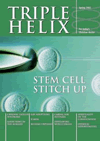There is no doubt that stem cell technology holds great promise for sufferers of degenerative conditions like diabetes, Alzheimer’s and Parkinson’s disease, but the main issue addressed by the Lords’ Select Committee on Stem Cell Research was whether research on cloned human embryos was still necessary, given recent advances in the ethically acceptable alternative use of adult stem cells.
The Donaldson report, tabled in June 2000, on which the newly passed law is based, took what the Lords now acknowledge to be an overly pessimistic view of the properties of adult stem cells. Two years is a long time in science, and subsequent research has confirmed their amazing versatility in treating a wide variety of conditions in both humans and other mammals (www.stemcellresearch.org)
The very latest research from the University of Minnesota (reported in the New Scientist, 23 January) reports discovery of a new variety of adult stem cell (dubbed the multipotent adult progenitor cell or MAPC) which is easy to isolate and culture, and has been shown, given the right conditions, to have the same versatility as the embryo stem cell, but without the risks of immune rejection, uncontrolled growth or cancer.
Given the considerable technical and ethical problems of cloning human embryos, growing international opposition to the practice and the danger that reproductive cloning will follow, it is outrageous that the Lords’ committee have not only authorised it, but have misled the British public, and especially vulnerable patient groups, into believing that their best hope lies in this direction.
































